《复旦国际关系评论》稿例
(A)非生物+方璐+10210170027
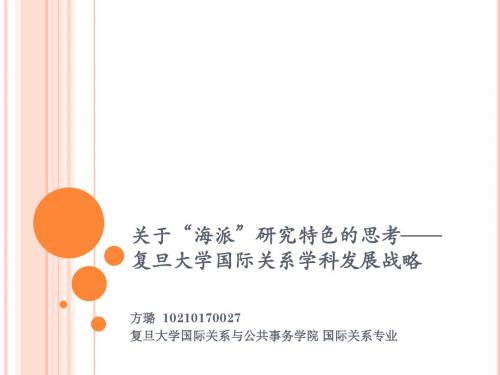
教授个人魅力和威望高,但大部分副教授还未成为复旦大学国际关 系学科的中流砥柱,长远来看,存在青黄不接的危险
外交人才输出量极少
国际关系学科的本科、硕士、博士毕业生进入外交部工作的比例大 大低于其他同等高校的国际关系学科,如北京大学、外交学院
复旦大学国际关系学科发展战略 ——对“海派”研究特色的再思考
三大高校国际政治系已发展为国际政治学院 改革开放以来,国际关系学科发展迅猛,除了三大高校之外,全国各 地的高等学府的国际政治系和类似专业迅速建立起来,国际关系学科 发展大有“显学”之势
导论 ——国际关系学科在国内的发展历史与现状(2)
国内目前的国际关系学科发展现状
教研机构:高校、研究机构 主要专业期刊建设与栏目建设 学者队伍:青年学者大量涌现,作为中 流砥柱的副高职称学者发表研究成果较 少 海外学术交流:“请进来”大于“走出 去” 研究进展:注重经验研究,对理论研究 投入较少 图2 主要期刊发表文章类型分布比例
自由开放的学 术氛围
教研队伍结构 比例良好
优质生源提供 后备科研力量
外交人才输出 量极少
复旦大学国际关系学科建设——内部建设
学科发展优劣势分析——优势
三大传统主力研究阵地之一,学科发展基础深厚,体系 设置完善,在学术界具有较好的口碑和权威认可;尤其 是在中欧、中美关系方面具有更系统的研究 相对于北方“京派”与政府部门之间的关系,复旦在学 术风格上更偏向于海派、欧美化,受现实政治束缚相对 小,学术自由氛围更为浓厚 目前科研团队形成了强大的教授群体、稳健的中青年副 教授群体和青年讲师群体
国际关系学科在国内的发展历史
1964年中国人民大学、北京大学和复旦大学建立国际政治系
复旦国务

【文科类】復旦国务复试经历侥幸进入复旦国际关系与公共事务学院(SIRPA)的复试,10个月换来了10分钟,不过留下了抹不去的惭愧和遗憾……先介绍下背景。
专业招5个,我排名第四,进入复试的是6个,6进5,貌似前五名被刷了可以院内调剂~~之前很早就知道已经进入复试了,但是一直没看书,直到临复试前7天收到复试通知。
那时我成了热锅上的蚂蚁,整天焦虑中,总体上还是没静心看书。
终于日期到了,带着忐忑的心情去上海了。
复试流程▌①中文的自我介绍,3分钟以内,但是在紧张的情况下,一分钟多点就能搞定的。
最后,最好,最好,最好谈到自己感兴趣的并且非常熟悉的研究方向或者论文要点(原因……见下文)之前忐忑得要死准备的英文自我介绍白准备了。
▌▌②专业问题(中文)问题因人而异。
多根据研究方向、学术兴趣来提问。
如果之前自我介绍没有提到这些,那么老师会问些他自己感兴趣的话题或者直接问你的论文。
这样容易被老师牵着鼻子走,丧失面试主动权,然后遭遇问题的狂轰乱炸。
我就这样,一开始自我介绍没谈及自己的学术兴趣,结果一上来劈头盖脸地问我与论文有关的问题,什么名词概念、研究对象、著作等等。
倒霉的孩子呀,进复试的就我被问得最多,整残了。
心里落了个洞!▌▌▌③专业英语还是根据研究方向和论文,围绕主要概念、主要观点展开。
我听懂了那老头的两个问题,无奈,专业英语实在不好,结果后来用了中文。
阿拉安大许多专业貌似不开专业英语课,太吃亏了。
强烈建议安大各非语言专业开设专业英语课!可惜~~血的教训①要有自己的研究方向,并要能够娴熟表达。
②熟悉自己的论文所涉及主要概念观点。
③与研究方向和论文相关的专业外语必须烂熟于心。
④镇定镇定镇定镇定镇定……被问的问题:①毕业论文题目是什么?②研究对象是什么?③研究地点在哪里?④说说关于社会资本的三本书的书名。
⑤结构洞是什么?⑥检验民主制度绩效的标准有哪些?⑦英文:社会资本的定义。
⑧英文:社会资本与民主制度的关系,何者更加首要?☀结局学院副院长说“好像没问题了吧,不过你面试表现确实很不理想”,听了超级惭愧,宁愿被淘汰。
里根在复旦的演讲稿英汉对照版全

Remarks at Fudan University in Shanghai, ChinaApril 30, 1984We've been in your country only 5 days, but already we've seen the wonders of a lifetime -- the Great Wall of China, a structure so huge and marvelous that it can be seen from space; the ancient city of Xi'an; and the Tomb of the Great Emperor and the buried army that guards him still. These are the wonders of ages past. But today I want to talk to you, the young people of a great university, about the future, about our future together and how we can transform human life on this planet if we bring as much wisdom and curiosity to each other as we bring to our scholarly pursuits.I want to begin, though, with some greetings. I bring you greetings not only from my countrymen but from one of your countrymen. Some of you know Ye Yang, who was a student here. He graduated from Fudan and became a teacher of English at this university. Now he is at Harvard University in the United States, where he is studying for a doctorate in comparative literature.My staff spoke to him before we left. Mr. Ye wants you to know he's doing fine. He's working hard on his spring term papers, and his thoughts turn to you often. He asked me to deliver a message to his former students, colleagues, friends, and family.He asked me to say for him, and I hope I can, ``Wo xiang nian da jia'' [I am thinking of all of you].He wants you to know that he looks forward to returning to Fudan to teach. And President Xie, he said to tell you he misses your friendship and encouragement. And Mr. Ye says you are a very great woman and a great educator. You will be proud to know that he received straight A's last term. And when we congratulated him, he said, ``I have nothing to be proud of myself; I am so proud of my university.''I'd like to say a few words about our . educational exchange programs. It's not entirely new, this exchanging of students. Your President Xie earned a degree from Smith College in the United States. Smith is also my wife Nancy's alma mater. And President Xie also attended MIT, Massachusetts Institute of Technology, one of our greatest universities of science, engineering, and technology.But in the past few years, our two countries have enjoyed an explosion in the number of student exchanges. Five years ago you numbered your students studying abroad in the hundreds. Since then, 20,000 Chinese scholars have studied throughout the world, and more than half of them have come to American schools. More than 100 American colleges and universities now have educational exchanges with nearly as many Chinese institutions.We have committed more resources to our Fulbright program in China than in any other country. Two of the American professors teaching here at Fudan are Fulbrightprofessors. And there are 20 American students studying with you, and we're very proud of them.American students come to China to learn many things -- how you monitor and predict earthquakes, how you've made such strides in researching the cause and treatment of cancer. We have much to learn from you in neurosurgery and in your use of herbs in medicine. And we welcome the chance to study your language, your history, and your society.You, in turn, have shown that you're eager to learn, to come to American schools and study electronics and computer sciences, math and engineering, physics, management, and the humanities. We have much to share in these fields, and we're eager to benefit from your curiosity. Much of this sharing is recent, only 5 years old. But the areas of our mutual cooperation continue to expand. We've already agreed to cooperate more closely in trade, technology, investment, and exchanges of scientific and managerial expertise. And we have just concluded an important agreement to help advance our technological and economic development through the peaceful use of nuclear energy.That term ``peaceful use of nuclear energy'' is key. Our agreement rests upon important principles of nonproliferation. Neither of our countries will encourage nuclear proliferation nor assist any other country to acquire or develop any nuclear explosive device.We live in a troubled world, and the United States and China, as two great nations, share a special responsibility to help reduce the risks of war. We both agree that there can be only one sane policy to preserve our precious civilization in this modern age: A nuclear war cannot be won and must never be fought. And no matter how great the obstacles may seem, we must never stop our efforts to reduce the weapons of war. We must never stop at all until we see the day when nuclear arms have been banished from the face of this Earth.With peaceful cooperation as our guide, the possibilities for future progress are great. For example, we look forward to exploring with China the possibilities of cooperating in the development of space on behalf of our fellow citizens.Our astronauts have found that by working in the zero gravity environment of space, we will be able to manufacture life-saving medicines with far greater purity and efficiency, medicines that will treat diseases of heart attack and stroke that afflict millions of us. We will learn how to manufacture Factor 8, a rare and expensive medicine used to treat hemophiliacs. We can research the Beta Cell, which produces insulin, and which could provide mankind's first permanent cure for diabetes.New satellites can be launched for use in navigation, weather forecasting, broadcasting, and computer technology. We already have the technology to make the extraordinary commonplace. We hope to see the day when a Chinese scientist working out an engineering problem in Fudan will be able to hook into the help of a scientist at a computer at MIT. And the scientist in Boston will be able to call on the expertise of the scientist in Shanghai, and all of it in a matter of seconds.My young friends, this is the way of the future. By pooling our talents and resources, we can make space a new frontier of peace.Your government's policy of forging closer ties in the free exchange of knowledge has not only enlivened your economy, it has opened the way to a new convergence of Chinese and American interests. You have opened the door, and let me assure you that ours is also open.Now, all of this is particularly exciting in light of the recent history of our two countries. For many years, there was no closeness between us. The silence took its toll. A dozen years ago, it began to change. Together, we made it change. And now in the past 5 years, your policy of opening to the outside world has helped us begin to know each other better than we ever had before.But that process has just begun. To many Americans, China is still a faraway place, unknown, unseen, and fascinating. And we are fascinated. [Laughter]I wonder if you're aware of the many ways China has touched American life? The signs of your influence and success abound. If I were spending this afternoon in Washington, I might look out the window and see a man and woman strolling along Pennsylvania Avenue wearing Chinese silk. They might be on their way to our National Portrait Gallery to see the Chinese art exhibit. And from there, perhaps they would stroll to our National Gallery to see the new building designed by the Chinese American architect, . Pei. After that, they might end their day dining in a restaurant that serves Chinese cuisine. [Laughter]We associate China with vitality, enormous vitality, and something that doesn't always go along with that -- subtlety, the subtlety of discerning and intelligent minds.Premier Zhao saw something of the American attitude toward China when he visited us in January. He said after a few days in our country that he never expected such profound feelings of friendship among the American people for the Chinese people.Well, let me say, I'm happy to return the compliment. I have found the people of China to be just as warm and friendly toward us, and it's made us very glad.But meeting you and talking to you has only made me want to know more. And I sense that you feel the same way about Americans. You, too, wish to know more.I would like to tell you something about us, and also share something of my own values.First of all, America is really many Americas. We call ourselves a nation of immigrants, and that's truly what we are. We have drawn people from every corner of the Earth. We're composed of virtually every race and religion, and not in small numbers, but large. We have a statue in New York Harbor that speaks of this, a statue of a woman holding a torch of welcome to those who enter our country to become Americans. She has greeted millions upon millions of immigrants to our country. She welcomes them still. She represents our open door.All of the immigrants who came to us brought their own music, literature, customs, and ideas. And the marvelous thing, a thing of which we're proud, is they did not have to relinquish these things in order to fit in. In fact, what they brought to America became American. And this diversity has more than enriched us; it has literally shaped us.This tradition -- the tradition of new immigrants adding to the sum total of what we are -- is not a thing of the past. New immigrants are still bringing their talents and improving the quality of American life. Let me name a few -- I think you'll know their names.In America, Wang computers have become a fixture in offices throughout the country. They are the product of the energy and brilliance of Mr. An Wang, who himself is the product of a Shanghai university.The faces of our cities shine with the gleaming buildings of Mr. . Pei, who first became interested in architecture as a student here in Shanghai.What we know of the universe and the fundamental nature of matter has been expanded by t he Nobel Prize winning scientist, Dr. Lee Tsung-Dao,who was born in Shanghai.We admire these men; we honor them; and we salute you for what you gave them that helped make them great.Sometimes in America, some of our people may disagree with each other. We are often a highly disputatious nation. We rather like to argue. We are free to disagree among ourselves, and we do. But we always hold together as a society. We've held together for more than 200 years, because we're united by certain things in which we all believe, things to which we've quietly pledged our deepest loyalties. I draw your special attention to what I'm about to say, because it's so important to an understanding of my country.We believe in the dignity of each man, woman, and child. Our entire system is founded on an appreciation of the special genius of each individual, and of his special right to make his own decisions and lead his own life.We believe -- and we believe it so deeply that Americans know these words by heart -- we believe ``that all men are created equal, that they are endowed by their Creator with certain unalienable Rights, that among those are Life, Liberty and the pursuit of Happiness.'' Take an American student or teacher aside later today and ask if he or she hasn't committed those words to memory. They are from the document by which we created our nation, the Declaration of Independence.We elect our government by the vote of the people. That is how we choose our Congress and our President.We say of our country, ``Here the People Rule,''and it is so.Let me tell you something of the American character. You might think that with such a varied nation there couldn't be one character, but in many fundamental ways there is.We are a fair-minded people. We're taught not to take what belongs to others. Many of us, as I said, are the children and grandchildren and great-grandchildren of immigrants, and from them we learned something of hard labor. As a nation we toiled up from poverty, and no people on Earth are more worthy to be trusted than those who have worked hard for what they have. None is less inclined to take what is not theirs.We're idealists. Americans love freedom, and we've fought and died to protect the freedom of others. When the armies of fascism swept Europe four decades ago, the American people fought at great cost to defend the countries under assault.When the armies of fascism swept Asia, we fought with you to stop them. And some of you listening today remember those days, remember when our General Jimmy Doolittle and his squadron came halfway around the world to help. Some of those pilots landed in China. You remember those brave young men. You hid them and cared for them and bound up their wounds. You saved many of their lives.When the Second World War was won, the United States voluntarily withdrew from the faraway places in which we had fought. We kept no permanent armies of occupation. We didn't take an inch of territory, nor do we occupy one today. Our record of respect for the freedom and independence of others is clear.We're a compassionate people. When the war ended we helped rebuild our allies -- and our enemies as well. We did this because we wanted to help the innocent victims of bad governments and bad policies, and because, if they prospered, peace would be more secure.We're an optimistic people. Like you, we inherited a vast land of endless skies, tall mountains, rich fields, and open prairies. It made us see the possibilities in everything. It made us hopeful. And we devised an economic system that rewarded individual effort, that gave us good reason for hope.We love peace. We hate war. We think -- and always have -- that war is a great sin, a woeful waste. We wish to be at peace with our neighbors. We want to live in harmony with friends.There is one other part of our national character I wish to speak of. Religion and faith are very important to us. We're a nation of many religions. But most Americans derive their religious belief from the Bible of Moses, who delivered a people from slavery; the Bible of Jesus Christ, who told us to love thy neighbor as thyself, to do unto your neighbor as you would have him do unto you.And this, too, has formed us. It's why we wish well for others. It's why it grieves us when we hear of people who cannot live up to their full potential and who cannot live in peace.We invite you to know us. That is the beginning of friendship between people. And friendship between people is the basis for friendship between governments.The silence between our governments has ended. In the past 12 years, our people have become reacquainted, and now our relationship is maturing. And we're at the point where we can build the basis for a lasting friendship.Now, you know, as I do, that there's much that naturally divides us: time and space, different languages and values, different cultures and histories, and political systems that are fundamentally different. It would be foolish not to acknowledge these differences. There's no point in hiding the truth for the sake of a friendship, for a friendship based on fiction will not long withstand the rigors of this world.But let us, for a moment, put aside the words that name our differences and think what we have in common. We are two great and huge nations on opposite sides of the globe. We are both countries of great vitality and strength. You are the most populous country on Earth; we are the most technologically developed. Each of us holds a special weight in our respective sides of the world.There exists between us a kind of equipoise. Those of you who are engineering students will perhaps appreciate that term. It speaks of a fine and special balance.Already there are some political concerns that align us, and there are some important questions on which we both agree. Both the United States and China oppose the brutal and illegal occupation of Kampuchea. Both the United States and Chinahave stood together in condemning the evil and unlawful invasion of Afghanistan. Both the United States and China now share a stake in preserving peace on the Korean Peninsula, and we share a stake in preserving peace in this area of the world.Neither of us is an expansionist power. We do not desire your land, nor you ours. We do not challenge your borders. We do not provoke your anxieties. In fact, both the United States and China are forced to arm themselves against those who do.The United States is now undertaking a major strengthening of our defenses. It's an expensive effort, but we make it to protect the peace, knowing that a strong America is a safeguard for the independece and peace of others.Both the United States and China are rich in human resources and human talent. What wonders lie before us if we practice the advice, Tong Li He Zuo -- Connect strength, and work together.Over the past 12 years, American and Chinese leaders have met frequently to discuss a host of issues. Often we have found agreement, but even when we have not, we've gained insight into each other, and we've learned to appreciate the other's perspectives on the world.This process will continue, and it will flourish if we remember certain things. We must neither ignore our problems nor overstate them. We must never exaggerate our difficulties or send alarms for small reasons. We must remember that it is a delicate thing to oppose the wishes of a friend, and when we're forced to do so, we must be understanding with each other.I hope that when history looks back upon this new chapter in our relationship, these will be remembered as days when America and China accepted the challenge to strengthen the ties that bind us, to cooperate for greater prosperity among our people, and to strive for a more secure and just peace in the world.You, the students at Fudan University, and the scholars at all the universities in China and America have a great role to play in both our countries' futures. From your ranks will come the understanding and skill the world will require in decades to come. Today's leaders can pave the way of the future. That is our responsibility. But it is always the younger generation who will make the future. It is you who will decide if a continuing, personal friendship can span the generations and the differences that divide us. In such friendship lies the hope of the world.When he was a very young man, Zhou Enlai wrote a poem for a schoolmate who was leaving to study abroad. Zhou appreciated the responsibilities that separated them, but he also remembered fondly the qualities that made them friends. And his poem ends:Promise, I pray, that somedayWhen task done, we go back farming,We'll surely rent a plot of groundAnd as pairing neighbors, let's live.Well, let us, as pairing neighbors, live.I've been happy to speak to you here, to meet you in this city that is so rich in significance for both our countries. Shanghai is a city of scholarship, a city of learning. Shanghai has been a window to the West. It is a city in which my country and yours issued the communique that began our modern friendship. It is the city where the Yangtze meets the East China Sea, which, itself, becomes the Pacific, which touches our shores.The Yangtze is a swift and turbulent river, one of the great rivers of the world. My young friends, history is a river that may take us as it will. But we have the power to navigate, to choose direction, and make our passage together. The wind is up, the current is swift, and opportunity for a long and fruitful journey awaits us.Generations hence will honor us for having begun the voyage, for moving on together and escaping the fate of the buried armies of Xi'an, the buried warriors who stood for centuries frozen in time, frozen in an unknowing enmity.We have made our choice. Our new journey will continue. And may it always continue in peace and in friendship. Thank you very much.Note: The President spoke at 3:40 . in the auditorium at the university.里根在复旦的演讲稿汉语版里根在复旦大学的演讲(摘要)—————————Monday, April 30, 1984 —————————我们访问中国才五天,所看到的名胜古迹却使我们一生难忘。
复旦国际关系真题
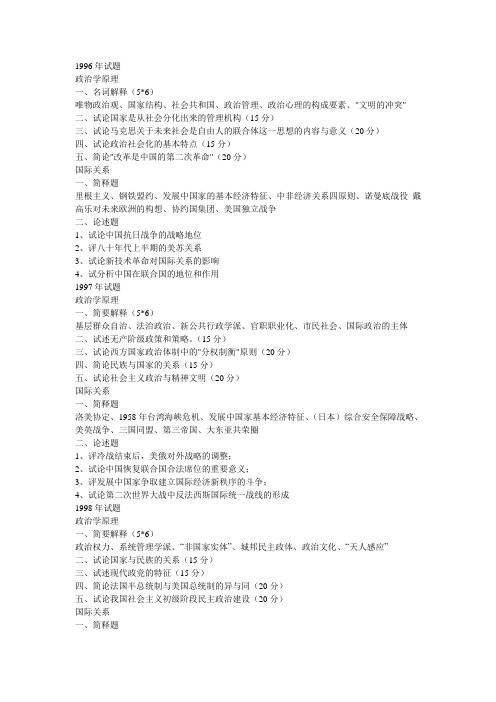
1996年试题政治学原理一、名词解释(5*6)唯物政治观、国家结构、社会共和国、政治管理、政治心理的构成要素、"文明的冲突"二、试论国家是从社会分化出来的管理机构(15分)三、试论马克思关于未来社会是自由人的联合体这一思想的内容与意义(20分)四、试论政治社会化的基本特点(15分)五、简论"改革是中国的第二次革命"(20分)国际关系一、简释题里根主义、钢铁盟约、发展中国家的基本经济特征、中非经济关系四原则、诺曼底战役戴高乐对未来欧洲的构想、协约国集团、美国独立战争二、论述题1、试论中国抗日战争的战略地位2、评八十年代上半期的美苏关系3、试论新技术革命对国际关系的影响4、试分析中国在联合国的地位和作用1997年试题政治学原理一、简要解释(5*6)基层群众自治、法治政治、新公共行政学派、官职职业化、市民社会、国际政治的主体二、试述无产阶级政策和策略。
(15分)三、试论西方国家政治体制中的"分权制衡"原则(20分)四、简论民族与国家的关系(15分)五、试论社会主义政治与精神文明(20分)国际关系一、简释题洛美协定、1958年台湾海峡危机、发展中国家基本经济特征、(日本)综合安全保障战略、美英战争、三国同盟、第三帝国、大东亚共荣圈二、论述题1、评冷战结束后,美俄对外战略的调整;2、试论中国恢复联合国合法席位的重要意义;3、评发展中国家争取建立国际经济新秩序的斗争;4、试论第二次世界大战中反法西斯国际统一战线的形成1998年试题政治学原理一、简要解释(5*6)政治权力、系统管理学派、“非国家实体”、城邦民主政体、政治文化、“天人感应”二、试论国家与民族的关系(15分)三、试述现代政党的特征(15分)四、简论法国半总统制与美国总统制的异与同(20分)五、试论我国社会主义初级阶段民主政治建设(20分)国际关系一、简释题"小协约国"、钢铁盟约、苏联东方战线、新技术革命的基本特征、中美建交联合公报、新日美安保条约、埃以"和平协定"、经济互相依赖理论二、论述题1、试析北约东扩的背景和影响2、论二十世纪三十年代苏英德战略三角关系3、改革开放以来中国与第三世界国家关系的新发展1999年考试题政治学原理一、简要解释(5*6)基层群众自治、"一党独大制"、国家结构、委员会共和制、策略性政治决策、柏拉图的"心灵论"二、为什么说我国社会主义改革是又一次革命(15分)三、试述资本主义国家政治参与的性质和形态(20分)四、试论民族独立国家独立自强发展道路的特点(15分)五、简论当代中国社会主义政治发展的前提和主要历史任务(20分)国际关系一、简释题日美安保体系、改革开放后中国新型党际关系准则、冷战后的新安全观、罗斯福总统的隔离演讲、相互依存的敏感性、大国伙伴关系热、和平共处五项原则、国际关系行为主体应具备的条件二、论述题1、试论二十世纪三十年代国际关系的的变化2、试论"一国两制"与香港回归的意义3、新科技革命对21世纪国际关系有何影响2000年试题政治学原理一、名词解释(5*6)唯物政治观、官僚制度、公民创制权、战争是政治的继续、政党政治、政治发展的民粹模式二、简答题(每题8分,共24分)1、为什么说:"商品是天然的平等派"2、简评现代化过程中的所谓"匀质化"特征3、简述政治文化的基本特点三、论述题(共46分)1、试论马克思主义关于国家政治统治必须以其社会职能为基础的思想(16分)2、试论宗教与政治的关系及我国的宗教政策(15分)3、试用分权理论简析西方国家政府机构间的关系(15分)国际关系一、名词解释布列斯特和约、远东慕尼黑阴谋、霸王战役、哈尔斯坦主义、拿骚协议、美国战略防御计划二、简答题1、"东方战线"在苏联卫国战争中所起的作用2、和平共处五项原则3、冷战后北约战略新概念三、论述题1、分析希特勒在二战前的外交战略2、试分析不扩散核武器条约(NPT)的内容和作用3、试论全球问题对国际关系的影响2001年试题政治学原理一、名词解释(5*6)政治权力、意识形态霸权主义、议会制君主立宪制、技术构成阶层论、管理程序学派、行政集权民主制二、简答1、当代中国政党制度的优点和缺点2、简要评价资产阶级分权学说3、集权制与分权制的区别与联系三、论述1、试述民族、宗教和国家的关系2、现代政党产生原因及其特点3、我国基层群众自治组织的发展历程国际关系一、名词解释布莱尔"第三条道路"、华沙条约、民族自决权、一条线战略、欧共体和马斯特里赫特条约、苏伊士运河危机二、简答题1、不结盟运动的基础2、人权和主权的关系3、冷战后中国与西欧关系的原则4、北约布鲁塞尔条约"双轨"政策的内容和目的三、论述题1、试论冷战前后中美关系的战略基础的演变2、试论二十世纪三十年代欧洲国际关系的基本特征3、二十世纪七十年代初美国外交政策的背景、内容、影响2002年试题政治学原理一、简要解释(5*6)政治权力、多元民主论、政党制度、总统制、国家与社会的关系、民族区域自治二、论述1、试论马克思主义国家学说关于“国家是一种虚幻的共同体”这一命题的意义(15分)2、西方资本主义国家官僚制度的历史地位及评价(20分)3、无产阶级政党的产生及其现代化(15分)4、发展中国家政治发展的基本特征(20分)国际关系一、名词解释上海精神、美苏中导谈判中的零和方案、罗迦诺公约、田中奏折、西欧联盟、埃以戴维营协议二、简答题1、二战后西方发达国家间关系的基本特征2、新马克思主义者关于经济全球化的主要观点3、二十世纪七十年代东西方关系缓和的主要成果三、论述题1、冷战后中国的伙伴关系战略2、二战期间雅尔塔会议及其他一些会议对战后世界秩序的安排及其实质3、欧盟共同外交和安全政策支柱的主要合作内容和性质2003年试题政治学原理一、简要解释(7*8)政治辩证法、代议民主制、政治参与的含义、民族的基本特征、政体与国体的关系、政府机构、内阁制、两党制及其政治实质二、现代政党的基本特征(18分)三、政治统治职能为什么须以社会职能为基础?这一理论对“治理”国家的意义28分四、民族的形成是资本主义发展的历史结果(18分)五、论政治发展的普遍性与特殊性,并分析我国政治发展的基本经验(30分)国际关系一、名词解释国家主权、软权利、古巴导弹危机、危机管理、拉巴洛协定、世界体系论、民主和平论、蒙巴顿方案、与台湾关系法二、简答题1、全球化条件下国家利益的变化(原试题上是国际利益的变化,后来老师说应该是国家利益,原试卷上字打错了)2、第二次世界大战对国际关系的影响三、论述1、中国与国际组织关系的变化2、冷战后美国推行“单边主义”的原因(最好从国际因素和美国因素两方面答)2004年试题政治学原理一、名词解释(56分)行为政治学、国家形态、政党政治、结构功能主义、政治发展的含义、阶级、民族区域自治、违宪审查权二、试论马克思、恩格斯“人的全面发展”思想及对我国社会主义建设的意义(18分)三、试对资本主义国家两党制和多党制进行比较分析(18分)四、试论政治文化的超前性和滞后性(28分)五、试论我国“当前改革是一场大变革”并用我国当代经济体制改革分析(30分)国际关系一、名词解释(70分)禁止核扩散条约、洛迦诺精神、贡比涅停战协定、八一七公报、新安全观、开罗宣言、斯大林格勒保卫战、万隆会议、舒曼计划、超越遏制二、述论威尔逊主义的内容、实质、影响(25分)三、论述:从“哈尔斯坦主义”到“新东方政策”的变化,分析西德对东德政策的变化及其影响(25分)四、论述:克林顿执政时期,美国和日本同盟政策的调整内容及其后果、影响(30分)政治学原理一、简要解释(8*7)国家结构形式、政治社会学、威权政体、现代政党的政治功能、政治决策、国家主权、民族与宗教二、中国政党制度的含义和特色(18分)三、你对于一切社会变迁和政治变革的终极原因都要从生产方式和交换方式中找寻这一命题是怎么理解的(28分)四、政治发展的偶然性和必然性的关系(18分)五、试论西方民主共和制的主要类型及其内在矛盾(30分)国际关系一、名词解释(6*8)P=(C+E+M)*(W+S)克莱因公式、军事-工业复合体、正义战争论、进攻性现实主义、大西洋宪章、里根主义、洛美协定、不结盟二、简答(12*4)1、国际关系组织化与民族国家之间的关系2、核武器冷战后世界中的作用并举例分析3、60年代的中国外交4、评苏联的"东方战线"及其在卫国战争中的作用三、论述(27*2)1、论述冷战后国际恐怖主义及911后大国合作的趋势2、1978年以后中国多边外交的内容与特点2006年试题政治学原理一、名词解释(56分)多元民主论、政府与国家的区别与联系、政治文化及其特点、总统共和制的特点、政治权力的合法性、民族自决权、政党制度二、论述社会主义国家马克思主义政党的地位与作用(18)三、论述社会共和国的内容与意义(18分)四、论述政府职能转变与政府改革(28分)五、论述政治发展与社会发展(30分)国际关系一、简要解释(6*8)“颜色革命”、国际联盟、"缓和" 、中美建交三原则、中导条约、东方战线、哈尔斯坦主义、公众外交二、简答(12*4)1、中国对第三世界国家外交政策及其演变2、多边国际组织对国际关的影响3、二战后大国对远东秩序的安排4、和平共处五项原则的思想渊源三、论述(27*2)1、建国后,我国处理与周边邻国关系的思想,政策及影响2、试论二战后欧美的关系变化2007年试题一、简释(80分)行为主义政治学、现代国家建设、公民不服从、法团主义、民粹主义、历史制度主义、威权政体、寡头统治铁律、政治动员、《多元民主理论的困境》二、是一段阿尔蒙德论述政治文化的材料,然后回答三个问题1、政治文化的含义(5分)2、为什么说成功的民主政治需要政治文化支撑(5分)3、阿尔蒙德所说的政治文化是什么类型的政治文化(5分)三、“早期的政党产生并局限于议会,现代大众型政党走向并根植于社会”的原因及其促进因素(20分)四、有限政府之“有限”的内涵和原因(15分)五、论述社会革命与政治革命的关系(20分)国际关系一、名词解释(5*8)尼克松主义、古巴导弹危机、正义战争论、新中世纪主义、中国东盟自由贸易区、国家利益、全球化、万隆会议二、简答(15*4)1、国际联盟的成与败2、中日关系的政治基础3、政党外交与国家外交的关系4、中国与国际组织关系的发展历史三、论述(25*2)1、第二次世界大战结束后南北关系的发展演变2、国际关系的民主化与制度2008年试题(不全,国关差一道名解)政治学原理一、名词解释(80分)守夜人国家、违宪审查权、行政集权民主制、多头政治、《集体行动的逻辑》、社会资本、比例代表制、民主社会主义、戴维斯曲线、趋同论二、“民粹主义”对大众道德,智慧与力量的崇拜。
国际关系论文(范文精选6篇)
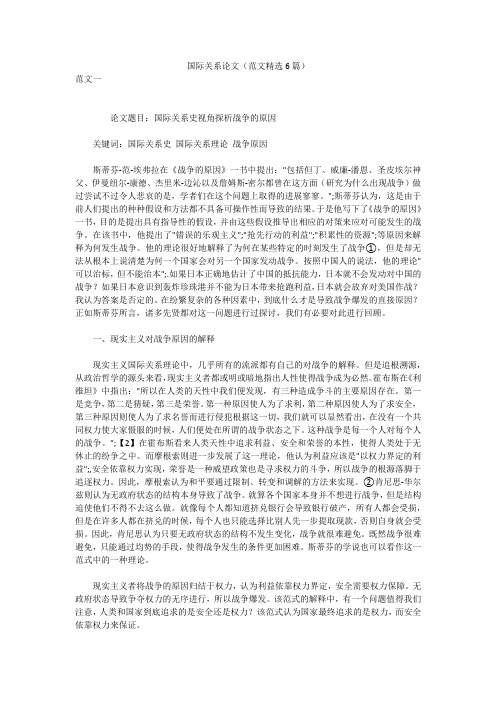
国际关系论文(范文精选6篇)范文一论文题目:国际关系史视角探析战争的原因关键词:国际关系史国际关系理论战争原因斯蒂芬-范-埃弗拉在《战争的原因》一书中提出:"包括但丁、威廉-潘恩、圣皮埃尔神父、伊曼纽尔-康德、杰里米-边沁以及詹姆斯-密尔都曾在这方面(研究为什么出现战争)做过尝试不过令人悲哀的是,学者们在这个问题上取得的进展寥寥。
";斯蒂芬认为,这是由于前人们提出的种种假设和方法都不具备可操作性而导致的结果。
于是他写下了《战争的原因》一书,目的是提出具有指导性的假设,并由这些假设推导出相应的对策来应对可能发生的战争。
在该书中,他提出了"错误的乐观主义";"抢先行动的利益";"积累性的资源";等原因来解释为何发生战争。
他的理论很好地解释了为何在某些特定的时刻发生了战争①,但是却无法从根本上说清楚为何一个国家会对另一个国家发动战争。
按照中国人的说法,他的理论"可以治标,但不能治本";.如果日本正确地估计了中国的抵抗能力,日本就不会发动对中国的战争?如果日本意识到轰炸珍珠港并不能为日本带来抢跑利益,日本就会放弃对美国作战?我认为答案是否定的。
在纷繁复杂的各种因素中,到底什么才是导致战争爆发的直接原因?正如斯蒂芬所言,诸多先贤都对这一问题进行过探讨,我们有必要对此进行回顾。
一、现实主义对战争原因的解释现实主义国际关系理论中,几乎所有的流派都有自己的对战争的解释。
但是追根溯源,从政治哲学的源头来看,现实主义者都或明或暗地指出人性使得战争成为必然。
霍布斯在《利维坦》中指出:"所以在人类的天性中我们便发现,有三种造成争斗的主要原因存在。
第一是竞争,第二是猜疑,第三是荣誉。
第一种原因使人为了求利,第二种原因使人为了求安全,第三种原因则使人为了求名誉而进行侵犯根据这一切,我们就可以显然看出,在没有一个共同权力使大家慑服的时候,人们便处在所谓的战争状态之下。
复旦大学2022年国际关系硕士考研真题-精品
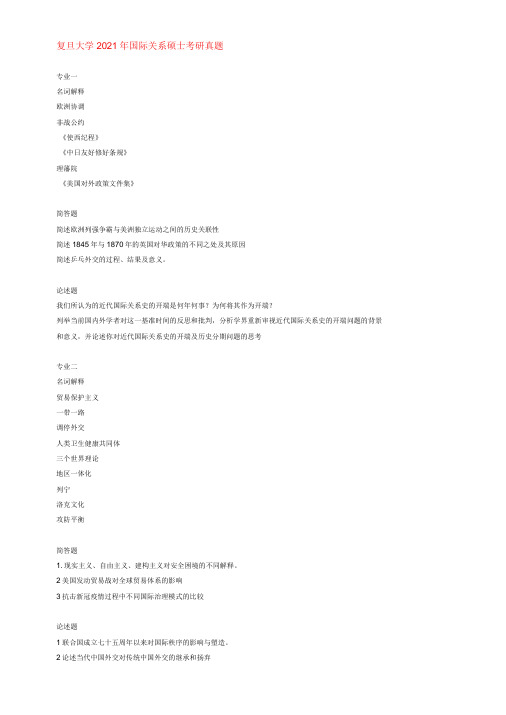
复旦大学2021年国际关系硕士考研真题
专业一
名词解释
欧洲协调
非战公约
《使西纪程》
《中日友好修好条规》
理藩院
《美国对外政策文件集》
简答题
简述欧洲列强争霸与美洲独立运动之间的历史关联性
简述1845年与1870年的英国对华政策的不同之处及其原因
简述乒乓外交的过程、结果及意义。
论述题
我们所认为的近代国际关系史的开端是何年何事?为何将其作为开端?
列举当前国内外学者对这一基准时间的反思和批判,分析学界重新审视近代国际关系史的开端问题的背景和意义,并论述你对近代国际关系史的开端及历史分期问题的思考
专业二
名词解释
贸易保护主义
一带一路
调停外交
人类卫生健康共同体
三个世界理论
地区一体化
列宁
洛克文化
攻防平衡
简答题
1.现实主义、自由主义、建构主义对安全困境的不同解释。
2美国发动贸易战对全球贸易体系的影响
3抗击新冠疫情过程中不同国际治理模式的比较
论述题
1联合国成立七十五周年以来对国际秩序的影响与塑造。
2论述当代中国外交对传统中国外交的继承和扬弃。
复旦大学出版社版《当代国际关系史》课程教学计划
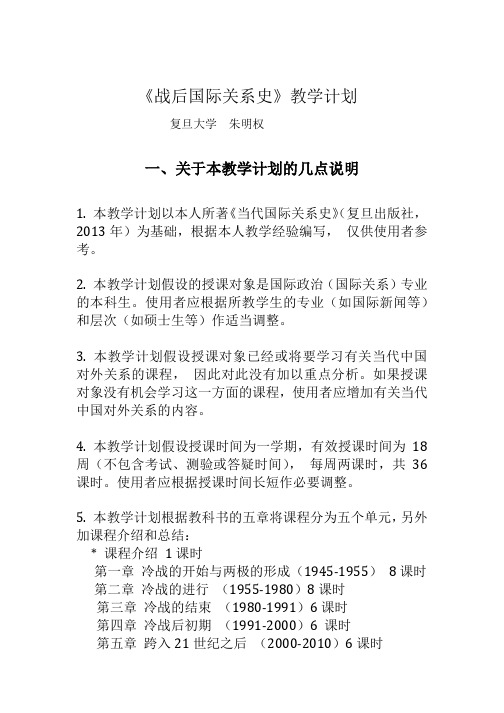
《战后国际关系史》教学计划复旦大学朱明权一、关于本教学计划的几点说明1. 本教学计划以本人所著《当代国际关系史》(复旦出版社,2013年)为基础,根据本人教学经验编写,仅供使用者参考。
2. 本教学计划假设的授课对象是国际政治(国际关系)专业的本科生。
使用者应根据所教学生的专业(如国际新闻等)和层次(如硕士生等)作适当调整。
3. 本教学计划假设授课对象已经或将要学习有关当代中国对外关系的课程,因此对此没有加以重点分析。
如果授课对象没有机会学习这一方面的课程,使用者应增加有关当代中国对外关系的内容。
4. 本教学计划假设授课时间为一学期,有效授课时间为18周(不包含考试、测验或答疑时间),每周两课时,共36课时。
使用者应根据授课时间长短作必要调整。
5. 本教学计划根据教科书的五章将课程分为五个单元,另外加课程介绍和总结:* 课程介绍1课时第一章冷战的开始与两极的形成(1945-1955)8课时第二章冷战的进行(1955-1980)8课时第三章冷战的结束(1980-1991)6课时第四章冷战后初期(1991-2000)6 课时第五章跨入21世纪之后(2000-2010)6课时* 课程总结1课时6. 本教学计划每一单元均包括“本章教学要点”,提出该单元教学中应当特别要解决的问题。
7. 本教学计划每一单元的各章均包括:(1)“本节讲授建议”,提出本节教学中要重点分析的问题,其他内容则可少讲甚至不讲,要求学生认真阅读教材即可。
(2)“本节讲授内容”,实际是根据教材的章、节、目的标题编成。
如上所说,学生应该学习和掌握这些内容,但是教师的讲授则须有所侧重。
8. 本教学计划所附教学大纲可在适当修改基础上发给学生。
9. 本教学计划所附PPT可在适当修改后于课堂上使用。
二、教学计划(正文)* 课程介绍(1课时)[讲授建议]1.着重分析国际关系研究的内涵(政策、理论和历史的结合)。
2.着重分析学习国际关系史的重要性。
3.着重分析研究国际关系的方法。
《复旦公共行政评论》己出书目
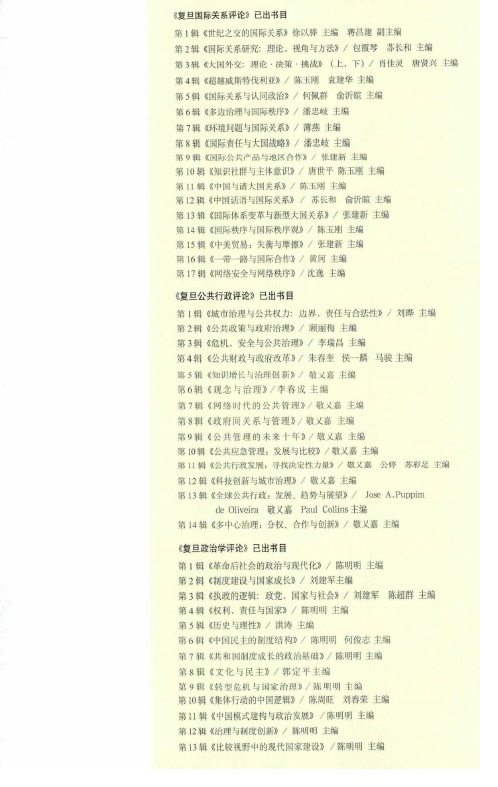
复 旦国 际 关 系 评论
》
已 出书
目
第
第 第 第 第 第 第 第 第 第 第 第 第 第 第 第 第
1
辑 辑 辑 辑 辑 辑 辑 辑 辑
0
《
世 纪之 交 的 国 际 关 系
国 际 关 系 研究
》
徐以 骅 主 编 视 角 与 方法 挑战
》
(
蒋 昌 建 副 主编
/
2
《
理论
、
》
包 霞琴 下
)
苏长和 主 编
、
边界
》
.
责任 与合法 性
》
/
刘眸 主 编
第2 辑 第
3
《
/
顾 丽梅 主 编
/
辑
《
安 全与 公共治 理
》
》
李瑞 昌 主编 侯 麟 马骏 主编
第4 辑
第
5
《
公共 财 政 与 政府 改 革
知 识增 长 与 治 理 创
/
朱春 奎
辑 辑 辑 辑 辑
0
《
新
》
/
敬 乂嘉 主 编
第 第 第 第 第
第
6
《
观念 与 治理
辑 辑 辑 辑 辑 辑 辑 辑 辑 辑 辑 辑 辑
《
革命后 社会 的政 治与 现代 化 制 度 建设 与 国 家成长 执政 的 逻 辑 权利
、
》
/
陈明 明 主 编
第
第
2
《
》
/
刘建 军 主编
》
3
《
政党
、
国 家与 社 会
/
/
刘 建军
陈 超群
论国际制度在当代国际关系中的作用
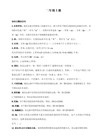
条约》、《导弹及其技术控制制度》、《全面禁止
核试验条约》等国际公约,对于违反协议的国
家则给予严厉谴责和制裁。从而对大规模杀伤
性武器的扩散起了一定的遏制作用。例如:印
度最近的五次核试验,国际社会反响强烈,各
国政府纷纷对印度予以谴责乃至制裁。法国
《费加罗报》评论说“印度没有违反任何协定,
美国严于律人,宽于对己,美国自己起草的有
关对它自己的化学武器进行核查的法律明确规
定,总统可挑选和选择核查人员以及不必阐明
理由拒绝来自某些国家人员核查。1997年美国
就拒绝了禁止化学武器组织两名雇员核查。这
两人一名是古巴人,一名是伊朗人,这两个国
家均被美国视为敌国。
如果再把历年来联合国通过的有关以色列
供信息、降低交易成本,使合作的可能性增加,
而且能使国家间通过彼此对对方行为拥有稳定
的心理预期而减少冲突的可能性。例如:在民
族国家间进行贸易时,国际制度能保持国际汇
兑稳定,维持有秩序的汇兑安排;在民族国家
发生金融危机时能提供外汇资金需要并避免竞
争性的汇率贬值,在双边或多边贸易发生冲突
时,能提供有效的仲裁服务。
多的支配力,凭借其强大实力把对自己有利的
经济规则强加到发展中国家头上。由此可见,
国际经济制度强调机会和过程公平,但起点却
是不公平的。例如投资自由化成为投资发展潮
流,无论发达国家还是发展中国家都实行投资
自由化政策,但由于国际金融资源分配不平
衡,大量流向发达工业国家,发展中国家只有
在金融方面采取比发达工业国家更加自由化的
奥巴马在复旦大学的演讲稿

There is a Chinese proverb: "Consider the past, and you shall know the future." We have known setbacks and challenges over the last 30 years. Our relationship has not been without disagreement and difficulty. But the notion that we must be adversaries is not predestined -- not when we consider the past. Indeed, because of our cooperation, both the United States and China are moreprosperous and more secure. We have seen what is possible when we build uponour mutual interests, and engage on the basis of mutual respect.中国有句名言:“温故而知新。
”过去30年中我们也曾遇到挫折和挑战,我们的关系不是没有分歧和困难。
但是,“我们必然是对手”的概念并非是注定不变的——回顾过去不会是这样。
由于我们的合作,美中两国都更加繁荣、更加安全。
我们已经看到我们本着共同的利益和相互的尊重去努力所能取得的成果。
And yet the success of that engagement depends upon understanding -- on sustaining an open dialogue, and learning about one another and from one another. For just as a American table tennis player pointed out -- we share much in common as human beings, but our countries are different in certain ways.可是,这种接触的成功取决于理解,取决于继续进行开诚布公的对话,相互了解,相互学习。
《复旦国际关系评论》稿约
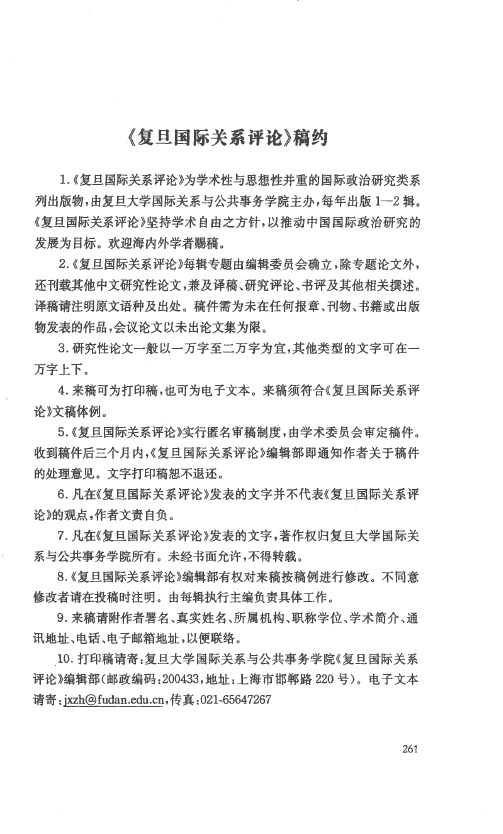
复 旦 国 际关 系 评 论 》稿 约
1
.
《
复 旦 国 际 关 系 评 论 》为 学 术 性 与 思 想 性 并 重 的 国 际 政 治研 究类 系
,
列 出 版物
《
由 复 旦 大 学 国 际 关系
与公 共 事 务 学 院 主 办 每 年 出 版
,
一
1
2
辑
。
复 旦 国 际关 系 评 论 》 坚 持学 术
传真
:
02 1 6 5 6 47 2 6 7
26 1
?
打 印 稿 请寄 复 旦 大 学 国 际 关 系 与 公 共 事 务 学 院 复 旦 国 际 关 系
:
《
评 论 》 编辑 部 邮 政 编 码
(
:
2 0 0 43 3
,
地址 上 海 市 邯 郸 路
:
-
2 20
号
) 。
电 子文 本
请寄
:
j
xz h
@ f uda n
.
edu c n ,
.
的 处 理意 见
6
.
《
复 旦 国 际 关 系 评 论 编 辑部 即 通 知 作 者 关 于 稿 件
》
。
。
文 字 打 印 稿 恕 不退还
》
凡在 《 复 旦 国 际 关 系 评 论 发 表 的 文 字并 不 代 表 复 旦 国 际 关 系 评
《
,
论 的 观 点 作 者 文责
》
自负
、
、
。
译 稿请 注 明 原文 语种 及 出 处
,
。
稿件 需 为 未 在 任 何报 章 刊 物 书 籍或 出 版
里根在复旦的演讲稿-英汉对照版-全
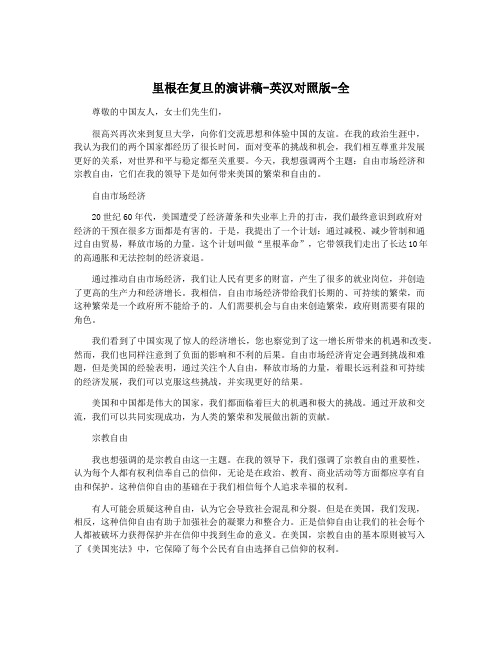
里根在复旦的演讲稿-英汉对照版-全尊敬的中国友人,女士们先生们,很高兴再次来到复旦大学,向你们交流思想和体验中国的友谊。
在我的政治生涯中,我认为我们的两个国家都经历了很长时间,面对变革的挑战和机会,我们相互尊重并发展更好的关系,对世界和平与稳定都至关重要。
今天,我想强调两个主题:自由市场经济和宗教自由,它们在我的领导下是如何带来美国的繁荣和自由的。
自由市场经济20世纪60年代,美国遭受了经济萧条和失业率上升的打击,我们最终意识到政府对经济的干预在很多方面都是有害的。
于是,我提出了一个计划:通过减税、减少管制和通过自由贸易,释放市场的力量。
这个计划叫做“里根革命”,它带领我们走出了长达10年的高通胀和无法控制的经济衰退。
通过推动自由市场经济,我们让人民有更多的财富,产生了很多的就业岗位,并创造了更高的生产力和经济增长。
我相信,自由市场经济带给我们长期的、可持续的繁荣,而这种繁荣是一个政府所不能给予的。
人们需要机会与自由来创造繁荣,政府则需要有限的角色。
我们看到了中国实现了惊人的经济增长,您也察觉到了这一增长所带来的机遇和改变。
然而,我们也同样注意到了负面的影响和不利的后果。
自由市场经济肯定会遇到挑战和难题,但是美国的经验表明,通过关注个人自由,释放市场的力量,着眼长远利益和可持续的经济发展,我们可以克服这些挑战,并实现更好的结果。
美国和中国都是伟大的国家,我们都面临着巨大的机遇和极大的挑战。
通过开放和交流,我们可以共同实现成功,为人类的繁荣和发展做出新的贡献。
宗教自由我也想强调的是宗教自由这一主题。
在我的领导下,我们强调了宗教自由的重要性,认为每个人都有权利信奉自己的信仰,无论是在政治、教育、商业活动等方面都应享有自由和保护。
这种信仰自由的基础在于我们相信每个人追求幸福的权利。
有人可能会质疑这种自由,认为它会导致社会混乱和分裂。
但是在美国,我们发现,相反,这种信仰自由有助于加强社会的凝聚力和整合力。
国际关系期刊发表推荐
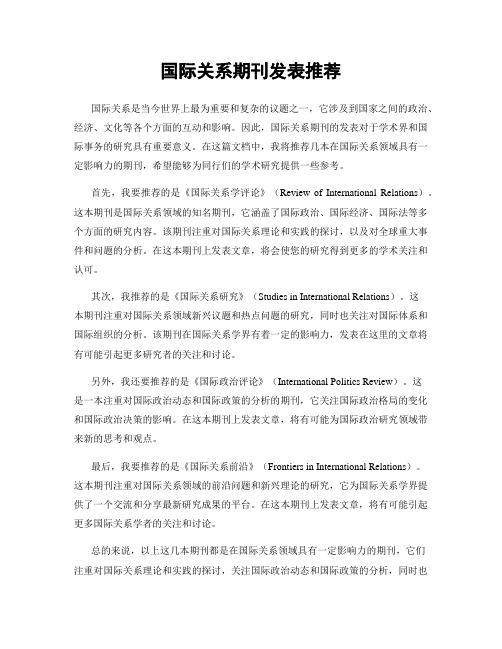
国际关系期刊发表推荐国际关系是当今世界上最为重要和复杂的议题之一,它涉及到国家之间的政治、经济、文化等各个方面的互动和影响。
因此,国际关系期刊的发表对于学术界和国际事务的研究具有重要意义。
在这篇文档中,我将推荐几本在国际关系领域具有一定影响力的期刊,希望能够为同行们的学术研究提供一些参考。
首先,我要推荐的是《国际关系学评论》(Review of International Relations)。
这本期刊是国际关系领域的知名期刊,它涵盖了国际政治、国际经济、国际法等多个方面的研究内容。
该期刊注重对国际关系理论和实践的探讨,以及对全球重大事件和问题的分析。
在这本期刊上发表文章,将会使您的研究得到更多的学术关注和认可。
其次,我推荐的是《国际关系研究》(Studies in International Relations)。
这本期刊注重对国际关系领域新兴议题和热点问题的研究,同时也关注对国际体系和国际组织的分析。
该期刊在国际关系学界有着一定的影响力,发表在这里的文章将有可能引起更多研究者的关注和讨论。
另外,我还要推荐的是《国际政治评论》(International Politics Review)。
这是一本注重对国际政治动态和国际政策的分析的期刊,它关注国际政治格局的变化和国际政治决策的影响。
在这本期刊上发表文章,将有可能为国际政治研究领域带来新的思考和观点。
最后,我要推荐的是《国际关系前沿》(Frontiers in International Relations)。
这本期刊注重对国际关系领域的前沿问题和新兴理论的研究,它为国际关系学界提供了一个交流和分享最新研究成果的平台。
在这本期刊上发表文章,将有可能引起更多国际关系学者的关注和讨论。
总的来说,以上这几本期刊都是在国际关系领域具有一定影响力的期刊,它们注重对国际关系理论和实践的探讨,关注国际政治动态和国际政策的分析,同时也关注新兴议题和热点问题的研究。
《国际关系分析》教学大纲
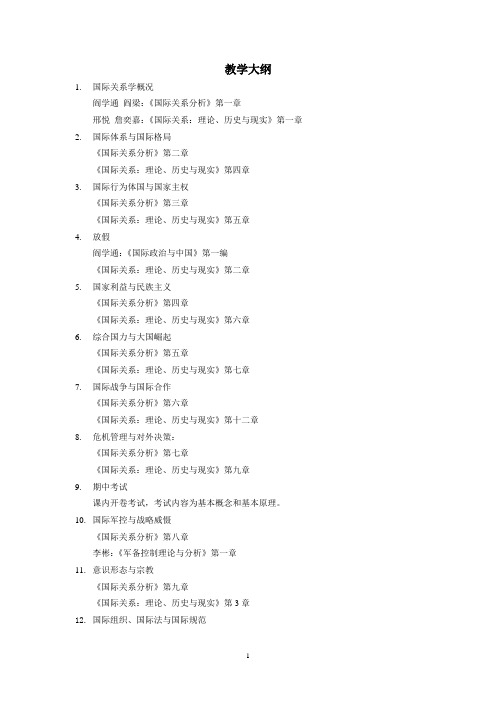
教学大纲1.国际关系学概况阎学通阎梁:《国际关系分析》第一章邢悦詹奕嘉:《国际关系:理论、历史与现实》第一章2.国际体系与国际格局《国际关系分析》第二章《国际关系:理论、历史与现实》第四章3.国际行为体国与国家主权《国际关系分析》第三章《国际关系:理论、历史与现实》第五章4.放假阎学通:《国际政治与中国》第一编《国际关系:理论、历史与现实》第二章5.国家利益与民族主义《国际关系分析》第四章《国际关系:理论、历史与现实》第六章6.综合国力与大国崛起《国际关系分析》第五章《国际关系:理论、历史与现实》第七章7.国际战争与国际合作《国际关系分析》第六章《国际关系:理论、历史与现实》第十二章8.危机管理与对外决策:《国际关系分析》第七章《国际关系:理论、历史与现实》第九章9.期中考试课内开卷考试,考试内容为基本概念和基本原理。
10.国际军控与战略威慑《国际关系分析》第八章李彬:《军备控制理论与分析》第一章11.意识形态与宗教《国际关系分析》第九章《国际关系:理论、历史与现实》第3章12.国际组织、国际法与国际规范《国际关系分析》第十章《国际关系:理论、历史与现实》第十一章13.国际经济关系与体制《国际关系分析》第十一章14.全球化、区域化与全球治理《国际关系分析》第十二章《国际关系:理论、历史与现实》第十三章15.未来的国际关系《国际关系分析》第十三章《国际关系:理论、历史与现实》第十四章16.答疑17.期末考试教材:阎学通、阎梁:《国际关系分析》北京大学出版社2008年版。
(请到教材科购买,也可从网上购买,不行再找助教帮助)。
课外阅读书目:邢悦詹奕嘉:《国际关系:理论、历史与现实》复旦大学出版社2008年版阎学通:《国际政治与中国》《国际安全理论经典导读》《王霸天下思想及启迪》《国际关系研究实用方法》(第二版)方连庆《战后国际关系史》(1945-1995)(上、下)王绳祖《国际关系史》(1-6卷)推荐阅读杂志:《国际政治科学》、《世界经济与政治》、《现代国际关系》、《国际问题研究》。
“三角和平论”与国际关系的“三维世界”
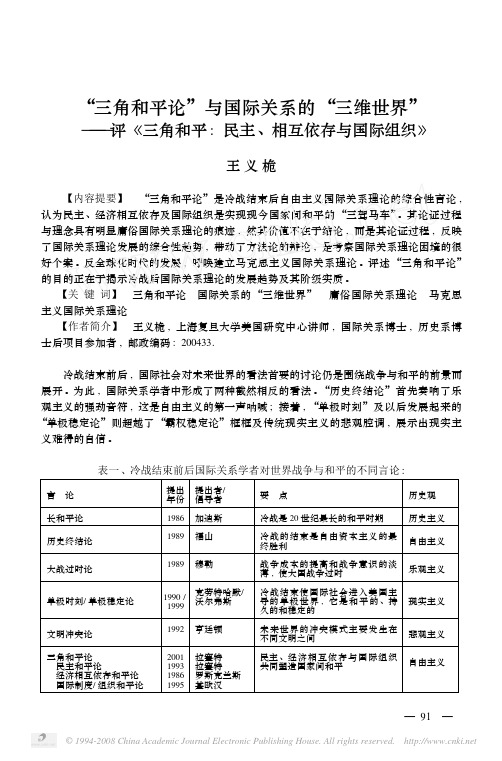
“三角和平论”与国际关系的“三维世界”———评《三角和平:民主、相互依存与国际组织》王义桅 【内容提要】 “三角和平论”是冷战结束后自由主义国际关系理论的综合性言论,认为民主、经济相互依存及国际组织是实现现今国家间和平的“三驾马车”。
其论证过程与理念具有明显庸俗国际关系理论的痕迹,然其价值不在于结论,而是其论证过程,反映了国际关系理论发展的综合性趋势,带动了方法论的辩论,是考察国际关系理论困境的很好个案。
反全球化时代的发展,呼唤建立马克思主义国际关系理论。
评述“三角和平论”的目的正在于揭示冷战后国际关系理论的发展趋势及其阶级实质。
【关键词】 三角和平论 国际关系的“三维世界” 庸俗国际关系理论 马克思主义国际关系理论【作者简介】 王义桅,上海复旦大学美国研究中心讲师,国际关系博士,历史系博士后项目参加者,邮政编码:200433.冷战结束前后,国际社会对未来世界的看法首要的讨论仍是围绕战争与和平的前景而展开。
为此,国际关系学者中形成了两种截然相反的看法。
“历史终结论”首先奏响了乐观主义的强劲音符,这是自由主义的第一声呐喊;接着,“单极时刻”及以后发展起来的“单极稳定论”则超越了“霸权稳定论”框框及传统现实主义的悲观腔调,展示出现实主义难得的自信。
表一、冷战结束前后国际关系学者对世界战争与和平的不同言论:言 论提出年份提出者/倡导者要 点历史观长和平论1986加迪斯冷战是20世纪最长的和平时期历史主义历史终结论1989福山冷战的结束是自由资本主义的最终胜利自由主义大战过时论1989穆勒战争成本的提高和战争意识的淡薄,使大国战争过时乐观主义单极时刻/单极稳定论1990/1999克劳特哈默/沃尔弗斯冷战结束使国际社会进入美国主导的单极世界,它是和平的、持久的和稳定的现实主义文明冲突论1992亨廷顿未来世界的冲突模式主要发生在不同文明之间悲观主义三角和平论 民主和平论 经济相互依存和平论 国际制度/组织和平论2001199319861995拉塞特拉塞特罗斯克兰斯基欧汉民主、经济相互依存与国际组织共同塑造国家间和平自由主义太平洋学报 2003年第3期种种言论及其根本分歧总体上是自由主义与现实主义两大国际关系理论体系间论战在新时代的继续和不同反映。
- 1、下载文档前请自行甄别文档内容的完整性,平台不提供额外的编辑、内容补充、找答案等附加服务。
- 2、"仅部分预览"的文档,不可在线预览部分如存在完整性等问题,可反馈申请退款(可完整预览的文档不适用该条件!)。
- 3、如文档侵犯您的权益,请联系客服反馈,我们会尽快为您处理(人工客服工作时间:9:00-18:30)。
复 旦 国 际 关 系 评 论 》稿例
目
、
、
文稿 请 按 题 字 左右
) 、 )
、
作者 以 星 号注 形 式注 明 作者单 位
( (
“
”
)
、
中文内容
提要 请按
(
2
00
关键 词
… …
3
5
个
)
、
正文之次序撰 写
。
节次或 内 容编号
目
、
(
1
、
(
1
)
之顺 序 排列
。
。
文 后 请 附 英 文题
和英 文 提 要
、
作 页码
七
、
如与前
引 用完 全相 同 可 简 化 为
,
“
同上
”
(
英文 用
“ I
b d
i
”
表示h
互联 网上 下载 的资料除 应注明作 者 题 目
、 。
、
时 间等信 息 外 还 应注
,
明 完整网 址 八
、
请尽 量 避 免 使 用 特 殊 字 体 编 辑 方式 或个 人格式
、
。
1
8 2
、
、
,
以 斜体 表 示 文 章 篇 名
请以 双 引 号
,
表示
。
古籍 书 名 与 篇名 连 用 时 可
,
用
?
将 书 名 与 篇 名 分 开 如 论语
《
?
述尔 h
日
,
四
、
正 文 或 注 释 中 出 现 的 页码 及 出 版 年 月
。
请 尽 量 以 公 元纪 年 并 以
阿拉 伯 数 字 表 示
五
“ 、
所有 引 注 均 须 详 列来 源
”
, ,
。
经 典注 释 可 随 文 夹 注 其他注 释
, :
律采
用 页 下 脚注 格式 并 当 页 标 号 请 参 考 以 下 附例
( )
书籍
1
.
中文
)
(
1
专著 倪世雄 等
:
:
《
当 代 西方 国 际 关 系 理 论
》
,
复 旦 大学 出 版 社 2 0 0
1
年 第
,
32
34
页
:
。
(2
)
编 著 倪 世雄 主编
1
:
《
冲 突 与 合作
71
:
现代 西 方 国 际关 系 理 论 评 介
》
,
四 川 人 民 出 版社
(
9 88
年 第
,
页
:
。
3
)
译著 罗 伯 特
:
?
吉尔 平
2 07
《
国际关 系 政治 经济学
》
,
杨宇光 等译 经
,
济 科 学 出 版社
(
1
989
年 第
, :
页
:
。
4
)
文集 中 的 文 章 黄 仁 伟
:
《
关 于 中 国 和平崛 起 道 路 的 再 思 考
G uy
Da n
i
els
,
N e w Yo rk
:
R
ch a rd s on
a
nd S ny d e r
“
,
1
984
,
ch
ap t e r 2
ri a
.
(
4
)
文 集 中 的文 章
and
:
R ay m ond A ro n
t ls
,
Wa r Wa r
”
a nd
I
n du s t
l
So c et y
i
,
,
。
二
,
、
正文 每 段 段 首 空 两 格
。
独 立 引 文左 右 各缩进 两格 上下 各 空
行 不必 另加 引 号
三
、
正文或注 释 中 出 现 的 中
“
;
、
日
文 书籍 期 刊 报 纸 之 名 称 请 以 书 名
、
、
,
号
《 》
表 示 文 章篇 名 请 以 双 引 号
;
”
表示
“ ”
。
西 文 著 作 期 刊 报 纸 之名 称 请
G
l
en n
Ke
“
s sl
er
,
Bu h A
s
i
ms
f
or
4
G r ea
w
t
er
i
de as t
P
an
,
Wa sh
i
n g t on
P os
,
t
^
F eb ru a r y
9
,
2 0 04
,
p
“
A
1
六
、
、
第
”
,
次 引 用 应 注 明 全 名 及 出 版 项 再次 引 用 可 以 简 化 为 作 者 著
:
:
《
中 国面 临 的 国际 安全环境 》
,
《
世 界知识
》 2〇
〇〇
年第
3
期
)
。
(
2
报 纸文 章 丁 刚
:
:
《
多 边合 作求 安 全
》
,
《
人民
日
报
》
2005
年
3
月
23
日
,
第
2
3
版
。
.
西文
“ )
(
1
期 刊论 文
:
:
Ba r
r
y
Bu z a n
he
,
E co no m C as e
. ,
ic
St
r u c t u re
an d
I
n t e r n a ti on a l
J ,
Se cur
i
t
y
T he L No
4
(
i
m
i
ts
of
t
L
i
be r a l
In
t
e rna
ti
ona l
O
r
gan
i
za
ti
on
j
Vo
l
3
8
,
Au
t
um n
1
984
)
,
pp gh
5
97 624
(
2
)
报纸文章
M
^
:
Ro b
l
i
n
Wr
i
t
an d
i
n
Le on
B ra mson
,
Ge org e G oe h a
t
e ds
,
:
S
c
t
udies
from
1
Ps yc ho
.
l
ogy
,
Soc o l o gy
i
an d
An
h ro
po
l
o gy
,
Ne w Y o r k
:
B as
i
Bo o k
s
,
96 8
(
二
.
)
论文
1
中文
)
(
1
期 刊 论 文 阎 学通
》
,
载上
海 市社 会 科 学界社联 合 会编
《
人 文 社会 科 学 与 当 代 中 国
》
,
上 海 市 社会 年 第
,
科学 界
1
2 00 3
年 度 学 术 年会 文 集
上海人民 出 版社
20 0 3
1 64
75
页
2
。
西文
1
)
(
专著
:
R o be r
t
K e oh an e
ቤተ መጻሕፍቲ ባይዱ
a nd
J os e
ph
Ny e
,
P ow e r
a nd
M
e f
rde
p end
1
8
1
■
复 旦 国 际关 系评 论第 十 七辑
e nce
Wor
44
.
l
d Po
li t
i
cs
i
n
Tra ns
i ti
on
,
Bo s
t
on
,
M A
.
:
L
i
tt l
e
Br ow n
,
1
9 77
,
pp 3 5
(
2
)
I
S
W
Ke nne Un N
i
i
t
h
Oye
,
ed
,
C oo pera
19
t
i
on
und er
Ana rch y
f
P
ri
n ce t on
,
N
J
:
Pr
3
i
n c eton
